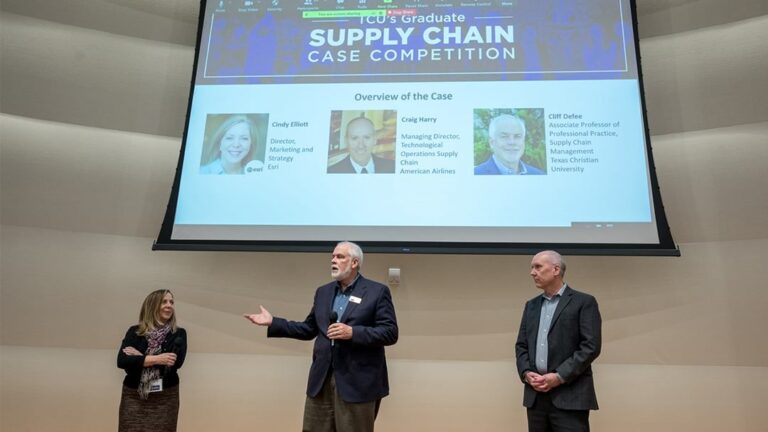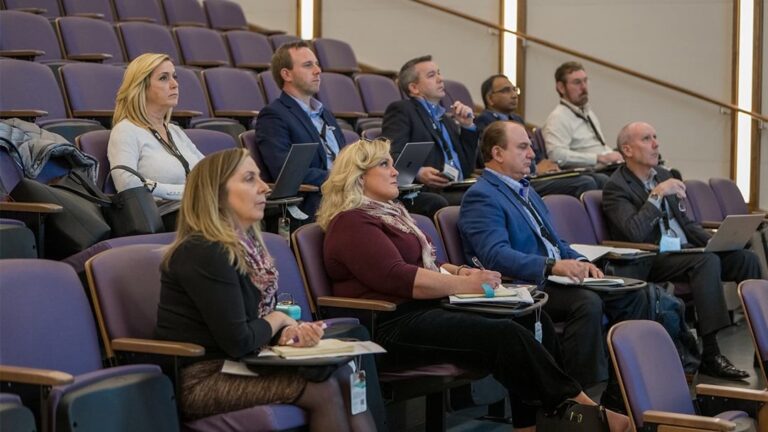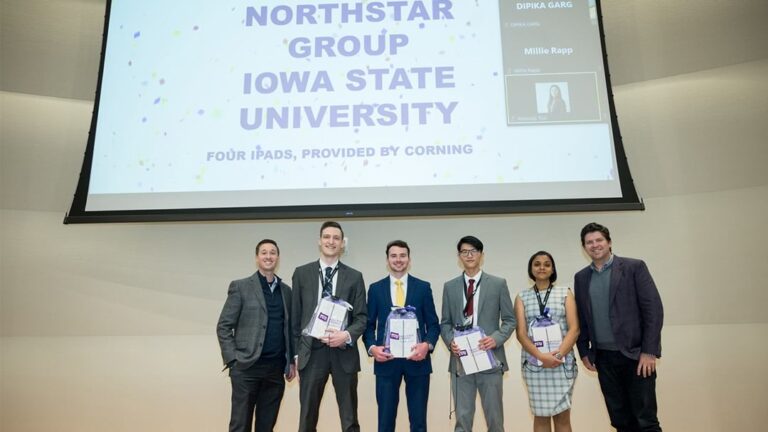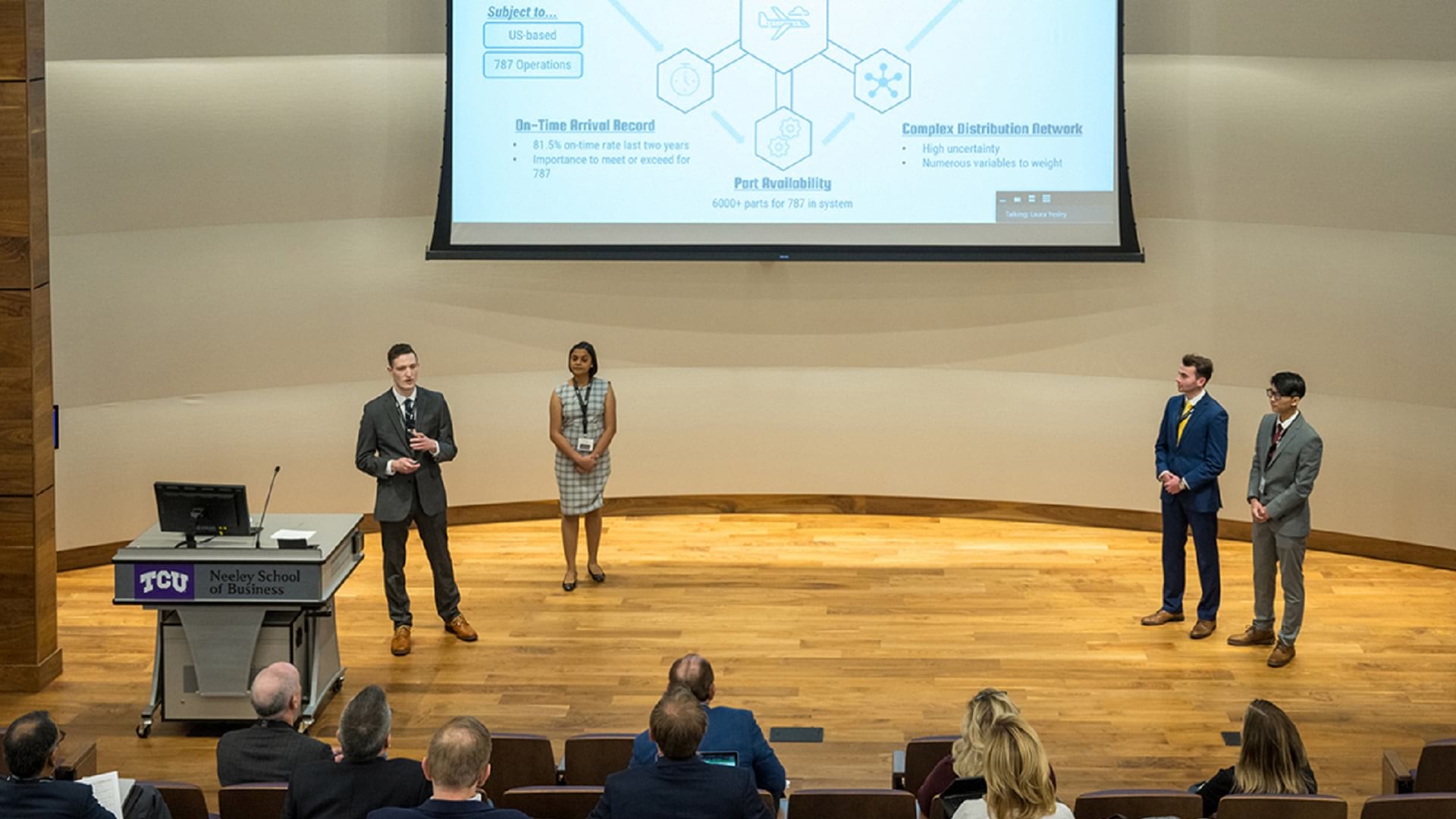The COVID-19 pandemic tested the ability of businesses across all industries to maintain resilient supply chains. Central to overcoming the challenge of ongoing disruptions is preparing a new generation of supply chain leaders to drive innovation and change that keeps pace with market demands.
That’s been the goal at Texas Christian University (TCU), which has hosted an annual supply chain case competition since 2017. Each spring, the Center for Supply Chain Innovation at the Neeley School of Business invites graduate students from the top business schools nationwide to compete for $30,000 in cash prizes.
Students have 24 hours to review a real-world supply chain case, brainstorm ideas, and develop a solution to present to executives and industry thought leaders. In February 2022, students from 19 universities and 20 sponsor companies—including Esri—gathered for this multifaceted learning experience. With data and training by Esri staff in the use of ArcGIS Online and ArcGIS Business Analyst, students set out to solve their case with the help of GIS software.

“When we envisioned the competition, we wanted to create an environment that blended academics, industry, and a hands-on experience for students to use cutting-edge technology,” said Morgan Swink, executive director of the TCU Neeley Center for Supply Chain Innovation. The approach offers a learning experience and networking opportunities for students to build relationships and discover industries that are new to them.
More than Just a Competition
The real-world scenarios used in the competition are provided by well-known organizations looking to test students’ problem-solving abilities. Each year, TCU Neeley faculty aim to focus the competition on a different industry and a new type of problem, highlighting the variety of challenges occurring in supply chains. BNSF Railway, Chick-fil-A, Nike, Lockheed Martin, and the National Restaurant Association have participated as case study providers in the past.
“From a case standpoint, we select cases that are real-life, current problems an industry is working on; these aren’t challenges with existing solutions for students to rehash,” said Cliff Defee, associate professor of professional practice in supply chain management at TCU Neeley. “Rather, the cases are built so that students have to strategically decide what they think is the best solution from their knowledge.”
In 2022, American Airlines provided the competition’s first-ever aircraft maintenance challenge, asking students to determine an inventory strategy for stocking repair parts for the Boeing 787 fleet at airports across the American Airlines’ US network. The teams worked with data involving more than 2,600 parts, worth millions of dollars, positioned at 26 airports and maintenance locations.
Craig Henry, managing director of technical operations supply chain at American Airlines, said in a press release that he feels the competition is a great opportunity to test the airline’s assumptions and explore new strategies. “Students’ outside-the-box thinking may raise potential solutions that we haven’t considered, and their approach to problem-solving helps us ensure we’re developing this capability on our own team.”

The winning team, Iowa State University, used location intelligence data to advocate for a centralized hub solution. “ArcGIS was very effective to justify our case without having to use various Excel functions,” said Nick Schiefelbein, a mechanical engineer and Iowa State University graduate student.
For Schiefelbein, who also competed in 2021, the opportunity to return after having not placed the previous year was a highlight of his college career and an invaluable learning opportunity.
“The competition is truly a wonderful way to take the subject matter we learned and apply it in a high-stress, business-like setting,” he said. “We had to relate information and our strategies in a proper, concise manner that appealed to executives.”
For the university’s faculty adviser, Henrik Sternberg, the win was both personally rewarding and a validation of the program’s training.
“The winning students are getting positive feedback from industry leaders on a solution they confidently presented based on a data-driven decision—it shows that they are well trained and gives a confidence boost,” said Sternberg.

The competition also provides an opportunity for academics to ensure their programs keep up with current industry needs and trends. “It can be a challenge to keep education programs aligned with industry because the tools and methodologies being used are constantly developing,” added Sternberg. “This event helps faculty stay current.”
Empowering Future Supply Chain Leaders
In Swink’s experience, GIS and spatial analytics are not often taught in business schools. However, he feels that with current data, analytic trends, and rising demand for geospatial analysis, the timing is right for universities to update their curriculum.
“We feel excited about the fact that we’re introducing these students to a technology that’s going to be hugely valuable and useful for them going forward, especially if they go into supply chain careers,” said Swink. “We hope that in promoting this technology in our competition, it diffuses into business schools and becomes a part of the business curriculum in other places.”
In conjunction with the case competition, TCU Neeley staff also work with business partners to offer a speaker series and networking opportunities for students.
“One of the things we try to do to set our competition apart is bringing these three groups—faculty, business partners, and students—together to lead to many different outcomes, like students finding a new career path, talent acquisition, development opportunities, research, and feedback for faculty,” said Swink. “It’s a win-win.”

